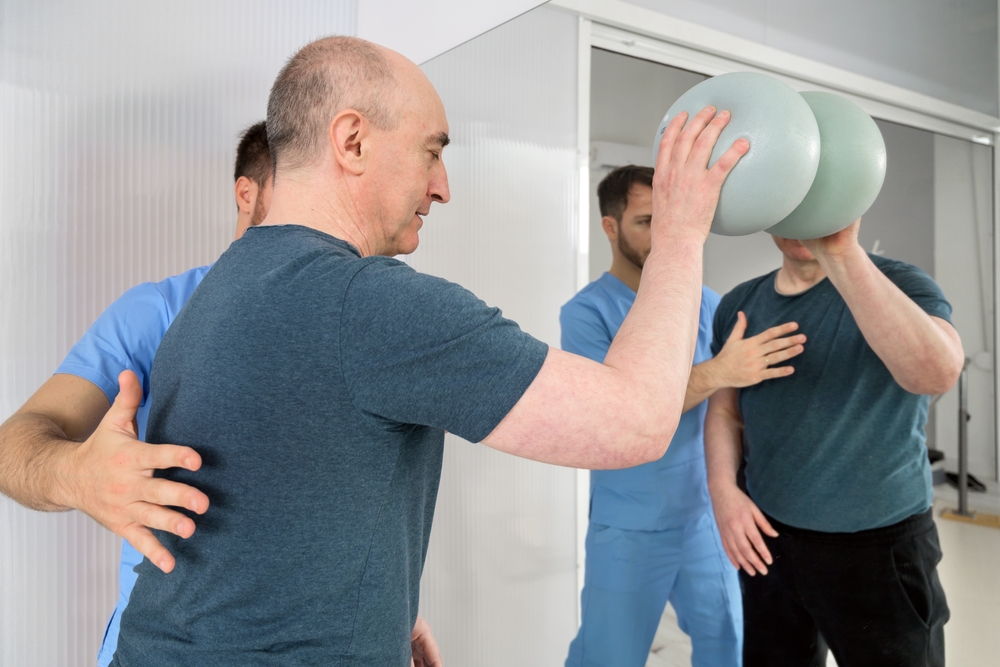Make an Appointment
Staying active and mobile is crucial for maintaining independence and improving quality of life, especially for individuals living with disability. Exercise physiology offers a gold standard approach by designing personalised exercise programs that target strength, balance, endurance, and functional movement. This blog explores how regular sessions with Exercise Physiologists can significantly benefit individuals with a range of common disabilities, empowering them to build strength, boost confidence, and reduce reliance on carers.

Understanding the Role of Exercise Physiology for Individuals Living with Disability
Exercise physiology is a specialised field dedicated to developing and implementing exercise programs tailored to an individual’s unique physical abilities and challenges. By conducting thorough assessments, Exercise Physiologists design targeted, evidence-based plans that improve mobility, manage pain, and enhance overall physical function.
Key Benefits of Exercise Physiology
Enhanced Mobility and Independence:
Tailored exercises improve muscle strength, balance, and coordination, enabling individuals to perform everyday tasks more confidently.
Effective Pain Management:
Specific training routines alleviate chronic pain, reduce muscle stiffness, and promote comfort during movement.
Improved Strength and Endurance:
Progressive resistance and functional training build muscle strength and cardiovascular endurance, crucial for daily activities.
Prevention of Further Injury:
By addressing muscle imbalances and improving joint stability, exercise programs reduce the risk of future injuries.
Boosted Confidence:
As physical abilities improve, increased independence leads to higher self-esteem and a reduced need for carer support.

How Exercise Physiology Enhances Function in Common Disabilities
Exercise Physiologists design customised programs to address the specific needs of individuals with various disabilities. Here’s how their expertise benefits six prevalent conditions:
1. Stroke/Acquired Brain Injury
Challenges:
Stroke and other acquired brain injuries can result in muscle weakness, impaired balance, and reduced coordination, which severely impact mobility.
Exercise Physiology Benefits:
Tailored programs focus on restoring movement, improving balance, and retraining motor skills to regain independence.
Example Intervention:
A combination of gait training, balance drills, and task-specific exercises that help relearn essential movement patterns and improve overall function.
2. Osteoarthritis
Challenges:
Osteoarthritis, a degenerative joint condition, causes pain, stiffness, and reduced range of motion, particularly affecting weight-bearing joints.
Exercise Physiology Benefits:
Customised low-impact exercises, such as aquatic therapy and gentle resistance training, help maintain joint mobility, reduce pain, and build muscle strength.
Example Intervention:
A regimen that includes cycling on a stationary bike, water aerobics, and targeted strength exercises to support affected joints and improve functional capacity.
3. Parkinson's Disease
Challenges:
Parkinson's Disease is characterised by tremors, rigidity, and slowed movement, impacting gait and balance.
Exercise Physiology Benefits:
Specialized programs focus on improving gait, enhancing balance, and increasing overall motor control, thereby reducing the risk of falls.
Example Intervention:
Treadmill training, balance exercises, and rhythmic movement routines designed to improve coordination and reduce rigidity.
4. Cerebral Palsy
Challenges:
Cerebral Palsy often leads to muscle spasticity, coordination difficulties, and limited mobility, significantly affecting daily function.
Exercise Physiology Benefits:
Tailored exercises that incorporate stretching, strength training, and functional movement can help improve motor control and reduce spasticity.
Example Intervention:
A combination of gentle resistance exercises, balance drills, and flexibility routines aimed at enhancing movement and promoting independence.
5. Muscular Dystrophy
Challenges:
Muscular Dystrophy is a group of progressive conditions that cause muscle weakness and degeneration, limiting physical function over time.
Exercise Physiology Benefits:
Customised, low-impact exercise programs help maintain muscle strength, improve coordination, and manage fatigue without overexerting the muscles.
Example Intervention:
A balanced program featuring light resistance training, gentle aerobic exercises, and stretching to preserve muscle function and support daily activities.
6. Multiple Sclerosis (MS)
Challenges:
MS can cause fatigue, muscle weakness, and balance issues, all of which contribute to decreased physical function.
Exercise Physiology Benefits:
Tailored exercise routines help manage symptoms by enhancing cardiovascular fitness, muscle strength, and overall endurance.
Example Intervention:
Interval training combined with low-impact aerobic exercises and targeted stretching routines to boost energy levels and improve overall function.

Collaboration with Other Allied Health Disciplines
The benefits of exercise physiology are maximised when Exercise Physiologists work closely with other allied health professionals. By integrating their expertise, clients receive a holistic, cohesive rehabilitation program that addresses all aspects of their needs.
Integrated Treatment Plans:
Exercise Physiologists collaborate with physiotherapists and occupational therapists to develop unified care plans that encompass both physical rehabilitation and functional adaptation. This collaboration ensures that improvements in strength and mobility are reinforced by strategies to enhance daily living skills.
Seamless Communication:
Working within a single, coordinated team means that communication between professionals is streamlined. This consistency allows for regular progress monitoring and timely adjustments to treatment plans, ensuring that every intervention is aligned with overall rehabilitation goals.
Holistic Support:
Integrated care provides comprehensive support for clients and their families. By receiving consistent advice from a dedicated team, clients experience smoother transitions in care and greater overall satisfaction with their treatment, reducing the burden on carers and enhancing independence.

Frequently Asked Questions
What is the role of exercise physiology for individuals living with disability?
Exercise physiology involves designing and implementing personalised exercise programs that improve strength, balance, endurance, and overall physical function, thereby enhancing independence and reducing reliance on carers.
Which disabilities benefit most from exercise physiology?
Common conditions that benefit include Stroke/Acquired Brain Injury, Osteoarthritis, Parkinson's Disease, Cerebral Palsy, Muscular Dystrophy, and Multiple Sclerosis. Each condition is addressed with targeted interventions to improve functional capacity and quality of life.
How often should exercise physiology sessions be conducted?
The frequency of sessions depends on individual needs and progress. Many clients benefit from regular sessions—often multiple times per week—with ongoing assessments to adjust the program as necessary.
What are the advantages of mobile exercise physiology?
Mobile exercise physiology delivers expert care directly to your home, reducing travel-related stress and ensuring that treatment is integrated into your daily environment. This is particularly beneficial for individuals with limited mobility.
How do Exercise Physiologists collaborate with other disciplines?
They work closely with allied health professionals, such as physiotherapists and occupational therapists, to create integrated treatment plans that address all aspects of rehabilitation, ensuring a holistic approach to care.

Conclusion
Staying active and mobile is essential for individuals living with disability, and Exercise Physiologists are key to making this possible. Through personalised, evidence-based exercise programmes, clients can build strength, improve balance, and enhance overall mobility—leading to greater independence and reduced reliance on carers. Whether managing conditions such as Stroke/Acquired Brain Injury, Osteoarthritis, Parkinson's Disease, Cerebral Palsy, Muscular Dystrophy, or Multiple Sclerosis, regular sessions empower individuals to lead more active, fulfilling lives.
By collaborating with other allied health professionals and utilising mobile services, the benefits of exercise physiology are fully realised, creating a seamless, integrated approach to rehabilitation. Embrace a future of enhanced strength, improved mobility, and greater independence.

Take the Next Step:
If you or someone you care for is ready to explore the transformative benefits of exercise physiology, contact us today to book an appointment or make a referral. To learn more about our comprehensive services, please explore:
Embrace a future filled with possibility, and take the first step toward a healthier, more independent life.

Date Published: Monday, March 31, 2025
Locate a NDIS Exercise Physiology
Service Near me
Get the experience & convinence you deserve to support your or a loved one's allied health needs.
Our NDIS Exercise Physiology team are currently serving & taking appointments in the following states and regions in Australia:
Need to get into direct contact with ur Client Services team? We're all ears. Call our team directly on 1300 731 733











